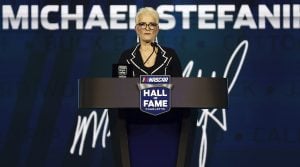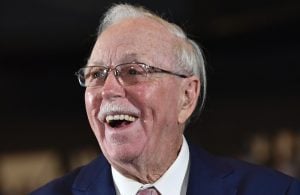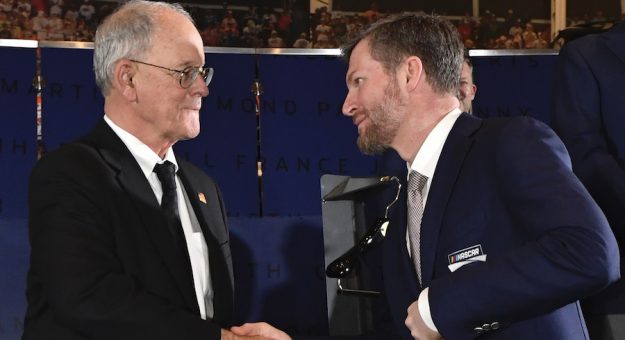CHARLOTTE, N.C. — At first glance — aside from sharing the profession of race car driver — Dale Earnhardt Jr., Mike Stefanik and Red Farmer couldn’t be more different from one another.
A perennial Most Popular Driver at NASCAR’s highest level of competition, Earnhardt holds two Daytona 500 wins among his 26 career victories.
More than that, as a driver, team owner and television analyst, Earnhardt has transcended both the sport of stock car racing and his own legacy as the son of seven-time NASCAR Cup Series champion Dale Earnhardt.
Stefanik, a hard-nosed New Englander, drove modifieds with a relentless tenacity that carried him to seven Whelen Modified Tour titles. Stefanik, who died in 2019 at age 61 from injuries sustained in the crash of a private plane, also collected two championships in what was then the Busch North Series.
The patriarch of the Alabama gang, Farmer accumulated innumerable victories—estimated between 700 and 900—at short tracks located primarily in the Deep South. At age 89, he still competes on the one-third mile dirt oval at the Talladega Short Track across the highway from NASCAR’s biggest superspeedway.
Despite their varying backgrounds and diverse racing pursuits, Earnhardt, Stefanik and Farmer now share one monumental achievement in common—after all three entered the NASCAR Hall of Fame during an induction ceremony at the Charlotte Convention Center on Friday night.
The climax of the ceremony was the induction of Earnhardt, who has made an indelible mark on a sport he was born to. Earnhardt joined his father, a member of the inaugural class of 2010 in the NASCAR Hall of Fame.
Earnhardt’s wife Amy performed the induction of her husband.
“My eyes are already watering,” Earnhardt said as the start to his acceptance speech. “…To join Dad in the Hall of Fame is probably as good as it’s going to get…
“I was a mechanic at a dealership. That was my destiny, or so I thought. I changed the oil in thousands of cars.”
From those inauspicious beginnings, however, Earnhardt followed his father into the NASCAR Xfinity Series, where he won back-to-back championships in 1998 and 1999, and then into NASCAR’s premier division, where he drove first for family-owned Dale Earnhardt Inc. and then for Hendrick Motorsports.
Earnhardt acknowledged the importance of uncle Tony Eury Sr., his crew chief; his sister Kelley Earnhardt Miller, who spurred the growth of JR Motorsports and Earnhardt’s broadcasting career; team owner Rick Hendrick; and Steve Letarte, his crew chief at that organization.
Key to his personal life, Earnhardt said, was wife Amy. “How do you explain someone who makes every day of your life better?” he said.
NASCAR Hall of Fame crew chief Ray Evernham opened the inductions by ushering Stefanik into the Hall. Stefanik’s wife Julie, who served as her husband’s spotter throughout his career, accepted the induction.

“This is a huge honor, and I know Michael would have been very humbled,” Julie Stefanik said of her husband, who set Whelen Modified Tour records for victories (74) and poles (48).
“He was more than just a racer to us. He was a beloved husband, father, brother and friend. And in his honor, I’ll have a Jack and diet (Stefanik’s favorite drink).”
Stefanik and fellow modified driver and mentor Richie Evans are the only drivers to win nine NASCAR championships. All of Evans’ titles came on the Modified Tour.
Three-time NASCAR Cup Series champion Tony Stewart inducted his close friend and hunting and fishing buddy Charles “Red” Farmer.
“He doesn’t know how to be quiet in a deer stand—I can tell you that,” Stewart said. “But his stats speak for themselves. He’s a racer’s racer and he deserves to be in the NASCAR Hall of Fame.”
Born in Nashville and starting his racing career in Florida, Farmer nevertheless considers Hueytown, Alabama his hometown, in part because of his association with fellow Alabama Gang members Bobby and Donnie Allison. Farmer has been racing for 75 of his 89 years.
“It’s something that gets in your blood, and you can’t get it out,” Farmer said in a “fireside chat” at the induction dinner before the official ceremony.

Though Farmer raced 36 times in the Cup Series over a 23-year span, with a best finish of fourth (twice) at Middle Georgia Raceway in Macon and Talladega Superspeedway, he routinely turned down full-time Cup offers in less-than-competitive equipment.
“I was not going to be an also-ran,” said Farmer, who preferred to win races and championships on the short tracks. That didn’t prevent him, however, from winning the Modified title in 1956.
The NASCAR Hall is the 10th hall of fame to honor Farmer.
“If these Hall of Fames were a Christmas tree with all the ornaments around it, this NASCAR award would be the gold star on top of that Christmas tree,” Farmer said during his induction speech.
As part of the Friday night program, the late Bob Jenkins was recognized with the Squier-Hall Award for NASCAR Media Excellence for his pioneering work in television and radio broadcasting.
The late Ralph Seagraves was honored with the 2021 Landmark Award for Outstanding Contributions to NASCAR. As an executive with R.J. Reynolds, Seagraves was instrumental in bring the Winston sponsorship to NASCAR’s foremost series, as well as to the grassroots racing NASCAR supported.
